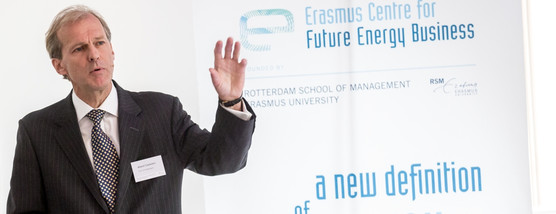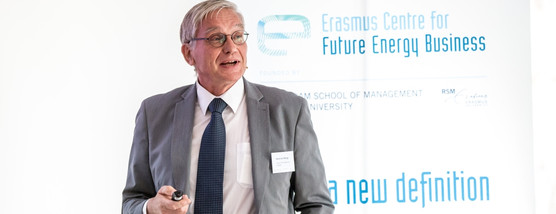Business Day
Erasmus Energy Forum demands smartgrids and common framework for future energy
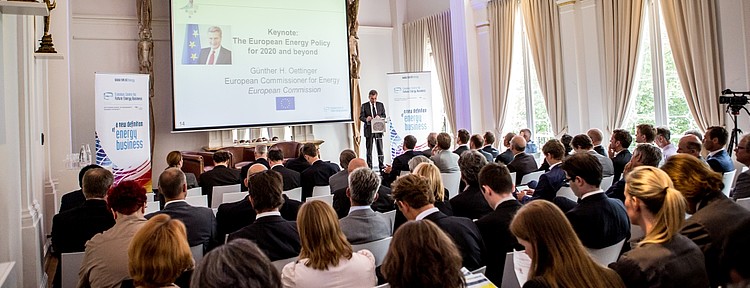
The energy industry needs a common European framework and will rely on smartgrids, but other changes are also required if it is to successfully transition to sustainable sources of energy, according to speakers from the top echelons of politics, business and academia. They were speaking during the first day of the two-day Erasmus Energy Forum 2014, hosted by Rotterdam School of Management, Erasmus University (RSM) at the Wereldmuseum in Rotterdam in June in front of an audience of 200 leaders from business and the energy industry, as well as researchers and academics.
In its third year, the Erasmus Energy Forum drew attention from organisations at the highest level with EU Commissioner for Energy Günther Oettinger as a speaker. He described the Erasmus Energy Forum as an excellent opportunity to discuss advances.
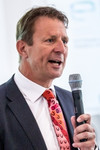 Dean of RSM Professor Steef van de Velde
Dean of RSM Professor Steef van de Velde
Engaging business schools and industry
Welcoming a capacity audience, Dean of RSM Professor Steef van de Velde emphasised the importance of engaging business schools and industry in public debate to discuss the problems posed by climate change and rising CO2 levels. Refusing to deal with such industries would “ignore what RSM stands for: education, knowledge, and engagement,” said the Dean.
Allard Castelein, CEO Port of Rotterdam
‘Plug and play’ environment for investors
Allard Castelein, CEO Port of Rotterdam and a member of RSM’s Advisory Board, said Rotterdam was hugely appropriate as the location for an international conference on future energy business. Its plan for optimising development opportunities and providing a ‘plug and play’ environment for investors will guarantee the wellbeing of local communities and include an increasing role for renewable energy, decentralised methodologies, the transition to renewable energy, and radical innovations.
“Rotterdam and the port will address the challenge to grasp the position of an energy balancing hub, matching energy supply and demand,” he said. “What connects all of these scenarios is the importance of smart grids and storage capacity,” he said, and echoed other speakers when he said a Europe-wide integrated energy policy is needed.
Professor Wolf Ketter, Scientific Director of the Erasmus Centre for Future Energy Business
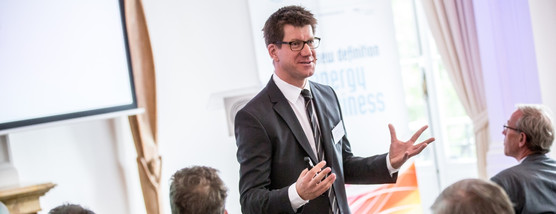
Optimism about renewable energy
Professor Wolf Ketter, Scientific Director of the Erasmus Centre for Future Energy Business (ECFEB) and RSM’s endowed Professor of Next Generation Information Systems, launched the day’s interactive proceedings, injecting his characteristic energy as he described challenges and new perspectives of the future energy market.
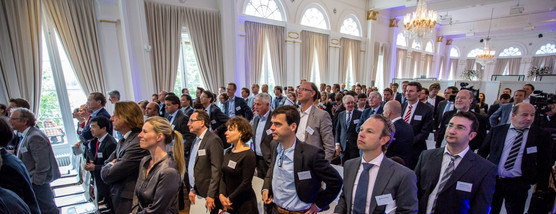
His quick poll of the audience indicated high levels of optimism about the use of renewable energy but it needs innovation. There are opportunities for future energy in wholesale and retail markets, in transmission and distribution, and with customers and prosumers. Real-time data is the ‘new gold’ and key to the energy business of the future. Gamification such as the energy market simulator www.powertac.org with a thousand users can help to test scenarios – for new entries, contexts, strategies, increasing competition for prices.
EU Commissioner for Energy Günther Oettinger
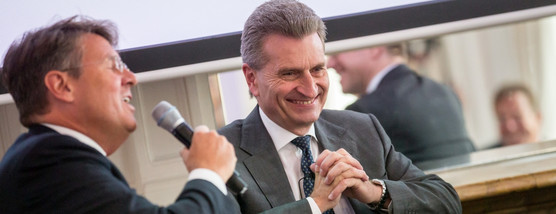
European challenges to overcome
EU Commissioner for Energy Günther Oettinger said Europe is on track to meeting its commitment to renewable energy but challenges include those posed by recent events in Ukraine; Oettinger has been prominent in recent negotiations ‘looking for a favourable outcome for all parties’, he said. “This is not a zero sum game. If there is no compromise, we will all lose.”
International and global challenges will affect everyone; homes, businesses and industry. The EU has made short, medium-term and long-term strategies, but some member states have direct energy relations with Russia, others via Ukraine. In the longer term, the Commission is looking to diversify suppliers and routes to protect critical infrastructure. Renewables and smartgrids have a huge role in making the energy system sustainable and improving consumption.
Put research to good use
The EU has funded research to stimulate innovation in sustainable energy, which must also be affordable. The Commissioner said Europe benefits from a wealth of expertise like that in the ECFEB and its pioneering research into future energy networks. The Commissioner concluded: “If we are divided we are weak. If we are one European team we are strong – we have to be connected.”
Hans ten Berge, Secretary General of Eurelectric
The industry’s manifesto
Hans ten Berge, Secretary General of Eurelectric, a pan-European union for the electricity industry, outlined Eurelectric’s manifesto for European energy policy now that a consensus on carbon targets has been reached.
First, decarbonisation of the industry by 2050 will benefit everyone, but increasing prices because of surcharges in wholesale markets are worrying, and the value of power companies is deteriorating. There are ‘illogical’ and varying levels of subsidy across Europe, resulting in a fragmented market and underperforming utilities that fail to satisfy current investors, but also fail to attract new investors.
The industry should look past 2020 to drive improved performance for renewables in the market, and should promote electricity and smartgrids for efficient and cheaper transport, heating and cooling.
The real cost of power
In addition, consumers need ‘the real cost of power on the bill’. The General Secretary said the industry should ‘forget about regulated prices’. They would not incentivise the industry, and prices have risen less in countries without price regulation. The ‘subsidy path’ is no longer affordable and the debate is now how to develop the market in an economical way.
Derek Bunn, Professor of Decision Sciences at London Business School
Facing risks in high-risk, low-return markets
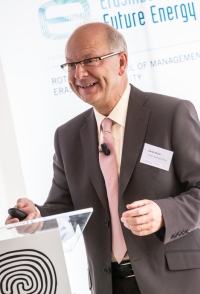
Derek Bunn, Professor of Decision Sciences at London Business School told the audience how the growth of renewables and innovation influence wholesale prices. He said the renewable energy market is a high-risk environment with low returns: “We must face these market risks in order to innovate,” he said.
The cost of financing for renewables increases and other costs remain, so flexibility comes not from the market but from outside initiatives – which doesn’t help carbon prices. “We can say goodbye to the effectiveness of carbon prices in a world where other measures are coming in,” said the professor.
Great interest in flexible production, for example solar power, draws investors into this infrastructure, but Bunn thinks the market will lose focus when renewable generation companies kick in. Credit rating agencies are downgrading energy companies in the US, in Europe and elsewhere.
Analysts want to see utility companies invest, but more policy initiatives make the investment community averse. Simulations reveal that subsidies may become locked in to the system and might not ‘disappear as innovations happen’; even though they were designed help the process of innovation.
Mel Kroon, CEO of TenneT
Renewables are game-changers
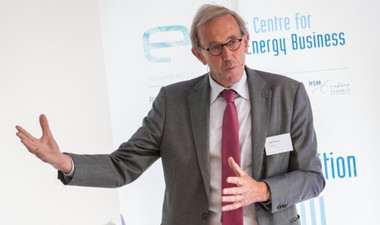
Renewable energy sources are game changers, said Mel Kroon, CEO of TenneT, which provides transmission grids in the Netherlands and in Germany. Supply-driven and weather-dependent, energy from renewable sources has no useful by-products such as inertia and reactive power, but production costs are low.
Plea for unified European energy market
Misalignments between national energy policies and subsidies create price distortions and inefficiency in generation, said Kroon. Instead, we need a unified European energy market design; only then can we use renewable energy sources most efficiently. He suggested removing subsidies and installing a monitoring mechanism and building power plants for when the strain on the grid is too great.
Panel 1 - EU Policies & Markets
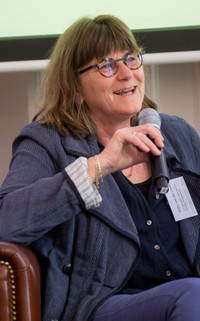 The morning’s speakers from business and industry formed the first panel of the Forum; they were joined by Professor Coby van der Linde of the Clingendael International Energy Programme to address EU policies and markets.
The morning’s speakers from business and industry formed the first panel of the Forum; they were joined by Professor Coby van der Linde of the Clingendael International Energy Programme to address EU policies and markets.
Business needs new European energy policies and markets
The EU and the USA could collaborate more on carbon emissions, gas prices and air pollution, suggested the panellists, who agreed governments are too dependent on tax revenues from classic energy sources and incorporating the cost of pollution and CO2 emissions into energy prices would solve many problems, but politics work against it.
On one hand, politicians should trust markets to drive innovation, building upon cultural strengths and existing platforms, but on the other hand, a political framework is needed; a claim that was to be heard several more times throughout the energy forum from various speakers.
Dr John Collins of the University of Minnesota wonders if the public understands that markets are distorted because of politics. Prof. van der Linde said ‘technology would sort out politics’ and we should respect diversity.
Prof. Peter Birkner, CTO of Mainova
Microgids and New Business Models Sessions
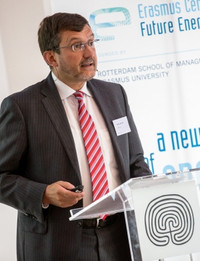
The Forum moved onto the subjects of Microgrids and new business models. As energy hubs, cities will play an important role in this future, argued Prof. Peter Birkner, CTO of Mainova, the utility company that supplies Frankfurt with energy.
Germany’s ambitious replacement of fossil fuels with 80 per cent renewables brings challenges: earning back the initial investment needed to build new energy sources; securing a steady supply and optimising technologies could cost up to 0.8 per cent of Germany’s GDP by 2020. Three basic principles are needed said Birkner; first, problems must be solved at the level where they occur. Second, diversification means using energy sources alongside each other, and third, existing energy systems should be technically modified.
Peter Smink, CEO of Nuon

No perfect answers to the perfect storm
Peter Smink, CEO of Dutch electricity and gas producer and supplier Nuon, said utility companies in the Netherlands try hard to hold onto their customers. National and regulated energy markets increase capacity, but price regulations are an issue and European utility stock prices are down. The industry will use reduced investments plans and utilise existing power plants flexibly. A new value chain is emerging, with natural sources on one side and consumers on the other. The focus will be on changing markets, different business models and new technologies, opening cross-border links and investing in infrastructure and harmonising European subsidies.
Nuon and parent company Vattenfall are investing in offshore wind and addressing flexibility with virtual power plants, e-mobility and heat storage. The company is also working on public private partnerships.
“It’s fun to be part of this. The big thing is to make sure we get this change going,” said Smink.
Robbert-Jan Stegeman, CIO of Alliander
A smartgrid-enabled world
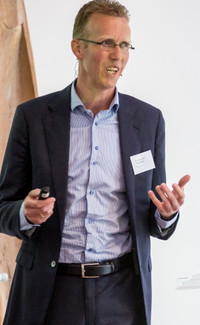
With technology moving fast, people are empowered by being connected, said Robbert-Jan Stegeman, CIO of Alliander, a network company that distributes electricity and gas to more than 5 million customers in the Netherlands, and provides services to complex energy infrastructures.
Computing becomes more efficient and cheaper every year; society is online around the clock, and there is an ‘internet of things’ running homes and offices. Business models have changed as homeowners rent out spare space, and consumers listen to music online. This ‘third industrial revolution’ is all about renewable energy, storage, intelligent grid, and electrical vehicles. “All of this can be realised with IT,” said Stegeman. “The hyper-connected world is now.”
During a Q&A session with moderator Victor DeConinck, Stegeman said that we must make sure that regulations don’t hold us back, and said consumers should become more aware.
Panel 2 - Microgids & New Business Models
Addressing the role of microgrids and new business models, the first afternoon panel featured Prof. Peter Birkner from Mainova, Peter Smink from Nuon and Robbert-Jan Stegeman from Alliander with Prof. Wolf Ketter from the ECFEB.
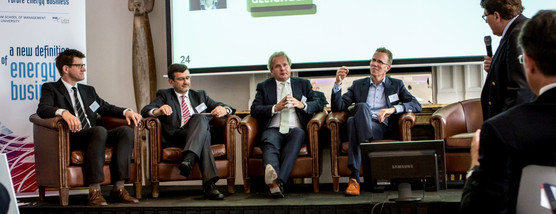
Major utility companies not required
Peter Birkner said major utility companies had lost their size advantage because flexibility is now the watchword. Even the role of making sure new technology is implemented could be done by a moderator or facilitator. Building renewables and reinforcing transmission grids is an expensive way to fix the problem, he said.
Electric Vehicles s could be the ‘Rosetta Stone’
The panel discussion included the role of batteries as storage elements, and the balance of supply and demand with storage and flexibility using the decentralised technologies that are coming to market. Electric vehicles could be the ‘Rosetta Stone’ – the key to unlocking and developing storage capabilities in a variety of consumer-operated devices. Researchers are currently working on big data and smart grid modelling people’s preferences and decisions so systems can act on customers’ behalf, in real time, but using data from domestic homes is a relatively new activity.
Overall, the public’s desire to be independent of large organisations and have cheaper energy drives households to become energy producers. Another view is that this house-by-house energy independence requires storage batteries and solar panels, but installing missing structures, and integrating supplies on a European, national and regional level is an alternative.
Prof. Marc Oliver Bettzüge from the Institute of Energy Economics, University of Cologne
A perspective of financing sustainable energy
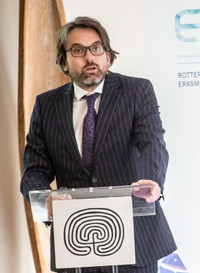
In the session that addressed financing sustainable energy, Prof. Marc Oliver Bettzüge from the
Institute of Energy Economics at the University of Cologne gave the German perspective of financing investments despite incoherent policies that make implementation of integration of sectors inefficient. He said the cheapest way to do this is to use gas instead of coal – one simulation indicates not to invest in renewables.
German consumers are indicative of the European transition from vertically integrated utilities, stacked monopolies and large scale central generation to a new world enabled and driven by liberalisation of the market, new generating technologies, smaller scales, shorter amortisation periods – and IT.
Guido Dubbeld, CFO of Dutch gas and electricity producer and supplier Eneco
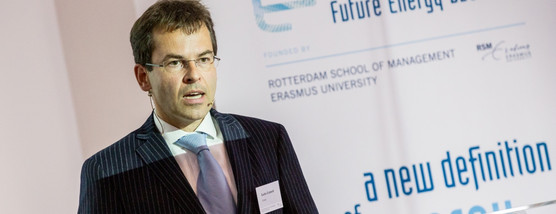
Solved by innovations that are yet to come
The Erasmus Energy Forum is home territory for Guido Dubbeld, CFO of Dutch gas and electricity producer and supplier Eneco, who has personal experience of building a house powered by renewables. Such houses could be connected to a marketplace that manages the intermittency of solar and wind power supplies – a problem which could still be solved and managed by innovations that are yet to come.
Solar panels are becoming more competitive said Dubbeld, making energy companies redundant or reducing their role to that of a service provider. “As soon as the whole nation starts to do this, then the traditional energy business is out of business.”
He predicted renewable energy prices will reach parity with fossil-fuelled energy in around 2020. Solar power will dominate over wind power, he believes, although traditional energy companies won’t have the funds to invest in them. He pointed out the failure of financial risk ratings agencies to keep up; they fail to recognise different levels of risk in the industry. New ways to raise investments could include stimulating local loyalty, partnering with other firms to access international investors, or by fixing prices for an extended period to guarantee cash flow.
Panel 3 - Financing Sustainable Energy
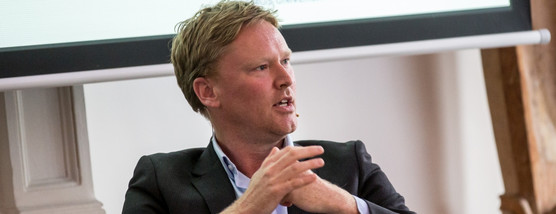
A panel on financing sustainable energy introduced some new faces: financial economist Dr Ronald Huisman of the ECFEB and Dr Martin Kröner from venture capital firm Munich Venture Partners, as well as Prof. Marc Oliver Bettzüge and Guido Dubbeld of Eneco.
Living in the past
Panellists agreed that the financial sector has a poor understanding of the complexity of the market, which is convoluted with political debate and ‘short-termism’. Economists and engineers have a hard time understanding each other, said Dr Ronald Huisman. While banks cannot risk investing in developers, pension funds ‘bundle’ projects together to present the scale they need.
Networking reception and poster session
At the close of the Forum presentations and panels, participants enjoyed a busy networking drinks reception, and continued to examine the research posters in the Wereldmuseum’s ballroom before the Forum Dinner.
Dinner debate
Two prominent speakers joined the networking dinner in the ballroom of Rotterdam’s Wereldmuseum that evening: Manon Janssen is CEO of Ecofys and leader of the Topsector Energie organisation, a government-funded initiative to stimulate sustainable energy production, and Jonathon Porritt is an eminent writer, broadcaster and commentator on sustainable development, and co-founder of Forum for the Future.
Manon Janssen CEO of Ecofys & leader of the Topsector Energie organisation
Technical innovations going to waste
Manon Janssen, CEO of Ecofys & leader of the Topsector Energie organisation, asked why it’s so hard to find business models that support the transition to sustainable, reliable and affordable energy without relying on a regime of subsidies. She claimed that technical innovations go to waste because of inadequate business models and quoted from a PwC survey that found 41% of businesses in the sector feel they need to transform it, and 53% expect their existing business models to undergo ‘important changes’. “The entire business proposition needs an overhaul,” she said.
In addition, the energy sector needs younger people comfortable working with new usage models of ‘rent and lease’ rather than ownership. “You are missing the point if you think of innovation as an enhancement of the status quo,” she said.
Jonathon Porritt, environmentalist and writer
Proof from emerging markets
Environmentalist and writer Jonathon Porritt said alternative and sustainable energy needs to be brought to the attention of people who need to know about it – investors, politicians and citizens at large. The convincing proof will come from not Europe or the USA, but from developing and emerging countries. He accused energy utilities in the EU of having vested interests against systemic and disruptive changes towards sustainability. Citizens should demand a system that won’t trash their prospects, he said, and accused the
USA of being ‘corrupted from top to bottom with incumbent carbon-intensive business intent on suborning others’. His final point was that it could all still be lost if the advantage is not seized. The Earth is in a perilous state facing potentially irreversible climate change which will affect the lives of future generations. No-one knows at which point climate change not only accelerates but becomes irreversible.
He told the audience that new technologies will sweep away the idea that nuclear power is part of a low carbon future. Communities are probably better placed to motivate and focus other communities, rather than mobilise governments.
Full-on war in energy markets
Hans ten Berge from Eurelectric, the union for the electricity industry said he agreed with Jonathan Porrit ‘on the way to go’ but said Porritt was ‘unjustified’ in saying that major energy companies were opposed to decarbonisation of the industry. They are ‘pleading for decarbonisation’, he said; the conflict is not there and it would be more correct to value the investments from Vattenfall and Eon.
Jonathan Porritt recognised ‘a good pushback’ on behalf of the energy industry and said he wished he could be as generous in the analysis. Those investments could have been made a long time ago, and we are held back on decarbonisation and innovation. It is now a ‘full-on war’ between those who have commanded energy markets with ‘rent-grabbing acumen’ for many years.
Day 2 of the Erasmus Energy Forum, an academic conference, was held at Erasmus University, Rotterdam, and culminated in the inaugural address of <link people wolfgang-ketter _blank>Wolf Ketter as Professor of Next Generation Information Systems at RSM. Professor Ketter is also Director of the Erasmus Centre for Future Energy Business, the driver behind the Erasmus Energy Forum.

